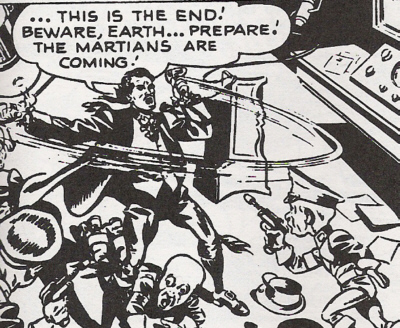Outside Comics
Orson Welles (1915-1985) was a well-known figure in all the world of the arts. A Wisconsin-native, Welles built a reputation as a pioneer showcasing to the world such works as the ground-breaking Broadway adaptation of Shakespeare’s Julius Caesar with Caesar (1937), the critically-accaimed radio broadcast of H.G. Wells’ ‘The War of the Worlds’ (1938) as well as the cinematic masterpiece ‘Citizen Kane’ (1941) (written, produced, directed by and starring Welles) – often hailed as the greatest-ever film for its innovative cinematography that changed the history of film-making.

Welles’ very recognizable voice, coupled with his many skills as an actor and director made cemented his reputation as one of the finest performers of the twentieth century. During his lifetime, Orson Welles received an Academy Award for his work on ‘Citizen Kane’ as well as an honorary Oscar, amassing three nominations in total. Welles also received a Grammy Award, an AFI Lifetime Achievement Award, a star on the Hollywood Walk of Fame, and other awards, nominations and honours.
Teaming up with Superman
Orson Welles teamed up with the last son of Krypton in Superman #62, helping the Man of Steel battle against the forces of a Martian-led attack on Earth. Welles’ on his way to the after-party following the completion of the1949 film ‘Black Magic’ is accidentally transported to Mars after investigating a seemingly abandoned ship that he discovered en route to the party.

After discovering the intentions of the Martian army, led by their leader, Martler, Welles seeks the help of Superman, warning him of the invasion, after the people of Earth failed to heed his words. This was because of Welles’ very famous radio broadcast of ‘The War of the Worlds’ – where people actually believed that Earth was under attack by aliens. While Superman battles the Martian army, Welles, draws upon his many talents such as magic tricks and vocal impressions is able to both stall the progressing army, and end the threat of invasion by neutralising the dictator Martler, convincing him to never again pursue his militaristic-styled invasions.


0 comments on “Orson Welles”Add yours →